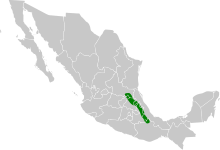The bearded wood partridge (Dendrortyx barbatus) is a bird species in the family Odontophoridae, the New World quail. It inhabits the Sierra Madre Oriental of Mexico.[2]
| Bearded wood partridge | |
|---|---|

| |
| Illustration by John Gould & H. C. Richter | |
| Scientific classification | |
| Domain: | Eukaryota |
| Kingdom: | Animalia |
| Phylum: | Chordata |
| Class: | Aves |
| Order: | Galliformes |
| Family: | Odontophoridae |
| Genus: | Dendrortyx |
| Species: | D. barbatus
|
| Binomial name | |
| Dendrortyx barbatus Gould, 1846
| |

| |
Taxonomy and systematics
editThe bearded wood partridge shares the genus Dendrortyx with two other species, all of which appear to be quite distinct from each other.[3] It is monotypic.[4]
Description
editThe bearded wood partridge is 33 to 35.5 cm (13.0 to 14.0 in) long and weighs between 405 and 459 g (14.3 and 16.2 oz). Adults have bluish gray cheeks, neck, and upper chest. There is a red patch around the eye. The crown is buff and has a small crest. The nape and chest are cinnamon, with red striations on the nape and sides of the chest. The back is a mix of buff, browns, and grays. Immatures are similar to the adults but their chest is duller and the flanks have brown bars.[3]
Distribution and habitat
editThe bearded wood partridge has a discontinuous range in the central part of Mexico's Sierra Madre Oriental. The Santo Domingo River in northern Oaxaca and western slope of the Sierra Madre Oriental act as biogeographic barriers.[5][6] It inhabits the interiors and edges of humid evergreen montane forest and pine-oak forest, both primary and secondary. It is also found in gardens and sometimes in farmland. It is often restricted to narrow riparian zones.[3]
Behavior
editFeeding
editThe bearded wood partridge forages on the ground. Its diet includes seeds, fruits, buds, tubers, and insects.[3]
Breeding
editLittle is known about the bearded wood partridge's breeding phenology. It is reported to breed between April and June. The male makes a dome-shaped nest with a tunnel entrance. The clutch size is usually five.[3]
Vocalization
editThe bearded wood-partridge's song is "a series of loud, rollicking whistles, repeated rapidly and often given in duet". The sexes' songs are similar but the female's is quieter. The song is mostly given at dawn and dusk. Groups sing to maintain contact.[3]
Status
editThe IUCN has assessed the bearded wood partridge as Vulnerable since 2000 after initially rating it Critically Endangered. "[S]urveys have found this species to be more widespread and numerous than previously thought, however it still has a highly fragmented range and small population undergoing a continuous decline."[1]
References
edit- ^ a b BirdLife International (2020). "Dendrortyx barbatus". IUCN Red List of Threatened Species. 2020: e.T22679576A178090964. doi:10.2305/IUCN.UK.2020-3.RLTS.T22679576A178090964.en.
- ^ Mota-Vargas, Claudio; Galindo-Gonzalez, Jorge; Rojas-Soto, Octavio (2017). "Crumble analysis of the historic sympatric distribution between Dendrortyx macroura and D-barbatus (Aves: Galliformes)". PLOS ONE. 12 (9): e0183996. Bibcode:2017PLoSO..1283996M. doi:10.1371/journal.pone.0183996. PMC 5580918. PMID 28863140.
- ^ a b c d e f Eitniear, J. C. (2020). Bearded Wood-Partridge (Dendrortyx barbatus), version 1.0. In Birds of the World (T. S. Schulenberg, Editor). Cornell Lab of Ornithology, Ithaca, NY, USA. https://doi.org/10.2173/bow.bewpar1.01 retrieved September 10, 2021
- ^ Gill, F.; Donsker, D.; Rasmussen, P. (July 2021). "IOC World Bird List (v 11.2)". Retrieved July 14, 2021.
- ^ Mota-Vargas, Claudio; Rojas-Soto, Octavio R.; Lara, Carlos; Castillo-Guevara, Citlalli; Ballesteros-Barrera, Claudia (2013). "Geographic and ecological analysis of the Bearded Wood Partridge Dendrortyx barbatus: Some insights on its conservation status". Bird Conservation International. 23 (3): 371–385. doi:10.1017/S0959270912000329.
- ^ Eitniear, Jack C.; Sergio, Aquilar R.; Gonzalez, Victor; Roberto, Pedraza R.; Baccus, John T. (2000). "New Records of Bearded Wood-Partridge, Dendrortyx barbatus, (Aves: Phasianidae) in Mexico". The Southwestern Naturalist. 45 (2): 238–241. doi:10.2307/3672468. JSTOR 3672468.
